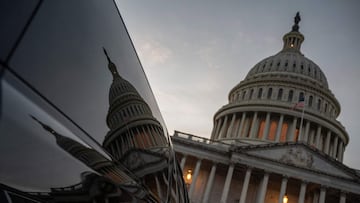What is the Social Security Fairness Act and who would it affect? Does it have a chance to pass?
The Social Security Fairness Act received a setback last week. However, lawmakers in the House are expected to move forward this week on the legislation.

Lawmakers in the House of Representative are expected to try to pass a bipartisan bill that would affect Social Security benefits for workers who receive other non-covered pensions. The legislation, called the Social Security Fairness Act was introduced by Democratic Rep. Abigail Spanberger of Virginia and Republican Rep. Garrett Graves of Louisiana.
Despite having strong support from both sides of the aisle, two Republican Freedom Caucus leaders, chairman Rep. Andy Harris of Maryland, and former chair Rep. Bob Goode of Virginia, tabled the bill. The hard-right group in Congress generally opposes new spending.
What is the Social Security Fairness Act and who would it affect? Does it have a chance to pass?
The Social Security Fairness Act of 2023, also known as H.R. 82, would eliminate the government pension offset (GPO) and the windfall elimination provision (WEP).
The latter adjusts the amount a Social Security benefit for people who have less than 30 years of significant earnings from employment covered by Social Security and who also receive a “non-covered pension.” These are pensions that are “paid by an employer that does not withhold Social Security taxes from your salary, typically, state and local governments or non-U.S. employers.”
GPO on the other hand “reduces the spousal or widow(er) benefit by two-thirds of the monthly non-covered pension,” says the Social Security Administration. Of the 5.84 million spousal or widow(er) beneficiaries in 2022, the GPO applied to roughly 12.6% of them. Approximately 70% of those affected had their entire benefit offset by the GPO.
The bill would add around $196 billion to the federal deficit over a decade according to estimates from the Congressional Budget Office (CBO). It would accelerate the depletion of the Social Security Trust Fund by about six months informed the nonpartisan CBO.
H.R. 82, the #SocialSecurityFairnessAct, is set for a House vote TOMORROW and needs a 2/3 majority to pass! This legislation would repeal the WEP & GPO, ensuring federal workers, including letter carriers, receive the full Social Security benefits they've earned. Urge your rep to… pic.twitter.com/mjze8ILMN0
— Letter Carriers (@NALC_National) November 11, 2024
Does the Social Security Fairness Act have a chance to pass?
In order to pass the House, because of the measure to table to bill, it will now require a supermajority in the lower chamber to approve the bill, or 290 out of 435 representatives. CBS reports that 300 have already signed onto the legislation, including Speaker Mike Johnson, but that was before he became Speaker.
Related stories
After that it will have to get through the Senate during the lame duck session of Congress. It would most likely require 60 votes for it to get through the upper chamber if opposition continues from the Freedom Caucus.
Should it clear that hurdle it would move on to President Biden’s desk to be signed. Failure to pass the legislation before the 118th Congress comes to a close, would require it to be reintroduced in a new Congress, where it would have to go through the procedural hurdles again.


